- Home
- Grace Callaway
The Lady Who Came in from the Cold Page 3
The Lady Who Came in from the Cold Read online
Page 3
Grief panged. Marcus had seen more than his fair share of death, and, even so, witnessing James struggle with that wasting disease, an invisible opponent that had worn his strong, vital brother down to skin and bones and then even less, had been devastating. If life was fair, James ought to still be alive, still the Marquess of Blackwood, standing where Marcus was.
But life wasn’t fair.
Thus, James had been buried in the cold earth for over a year now while Marcus wore the title like an ill-fitting castoff. He’d never had his brother’s charismatic personality, hadn’t been groomed to be a lord, and the years fighting abroad had made him even less suited to be a marquess. What he’d thought would be a homecoming turned out to be yet another foray into foreign territory.
He was a military man: he had no idea how to carry on as a nobleman. He had no penchant for the activities that made up a fashionable life. As far as he was concerned, clothing was to keep one warm and covered without getting in one’s way, and gambling and drinking to excess were a waste of time and money. Doing social rounds and making idle chitchat held even less appeal, and he hadn’t the faintest clue what to do with the townhouse and coterie of servants he’d inherited.
That’s why you need a wife, my boy—to help you settle into a routine, his mama had said. Despite her grief over her eldest, she roused herself from mourning to give Marcus a lecture at every opportunity. Miss Pilkington is perfect for you. Good ton, pretty as she can stare, and an heiress to boot. You can’t do better. What are you waiting for?
He supposed his mother was right. Cora Pilkington, daughter of the evening’s hosts, was an ideal candidate. Blonde and demure, she had perfect manners and a spotless reputation, earning her the status of a Diamond of the First Water. During their chaperoned visits, she’d proved to be charming company… if a bit overzealous in her admiration of his wartime actions. He’d proceeded with a slow, cautious courtship over the past three months, and her father, Charles Pilkington III, had made clear that an offer from Marcus would be heartily accepted.
All Marcus had to do was take that final step. Society thought the marriage a fait accompli already, and he didn’t know why he balked. He was no rake, attached to fantasies of bachelorhood. No, he wanted to be married and to start a nursery. Cora was the rational choice. And if the idea of marrying her failed to stir elation in him… well, that had to be his own failing, not hers.
His brother wouldn’t have been ruled by sentiment. A lord down to his very bones, James had always known his duty and done the right thing. If he’d concluded that Cora would make a perfect Marchioness of Blackwood, he would have married her forthwith.
As their mama would put it, No use shilly-shallying about.
Marcus resolved to talk to Miss Pilkington’s father soon.
The orchestra suddenly grew in volume, voices swelling. He turned to see the double doors opening… and then a vision appeared. A woman so beautiful that longing began to throb in his chest, a hidden wound he never knew he had. His flesh and blood wound, the scar from a sniper’s bullet, tautened on his left shoulder as awareness sizzled through him.
“Oh… hello,” she said.
By Jove, even her voice was beautiful. Sultry, like her lustrous raven tresses, yet sweet like her rose-tinted lips. Mystery and innocence wrapped in one perfect package. When she smiled, his breath lodged in his throat.
“I’m sorry to intrude,” she went on. “It seems you were here first. I was just looking for some privacy, but perhaps,”—although her tone was apologetic, her eyes sparkled with humor—“I am merely depriving you of yours?”
Stop gawking and say something, you idiot.
“The balcony is large enough to accommodate the both of us,” he managed.
She rewarded him with another smile before coming to lean her gloved arms on the balustrade next to him. Her pose was relaxed and companionable, as casual as if they were two soldiers sharing a break on the battlements. Peering into the darkness, she did the most remarkable thing: closing her eyes, she leaned into the night and inhaled deeply. His blood pumped thickly at the unaffected sensuality of her actions. Moonlight shimmered over her flawless skin and the luscious bounty of her décolletage. It glinted off the sparkling threads shot through the fabric of her gown, the elegant white column an ode to her nubile form.
“Honeysuckle.”
At the throaty word, he hastily yanked his gaze up from her voluptuous bottom. “Er, pardon?”
Her long, sooty lashes swept against dark, curving brows. Though the darkness obscured the precise color of her eyes, he guessed they were some rich shade—blue, maybe. There was no hiding the glimmer of amusement in them.
“Honeysuckle,” she repeated. “Do you smell it?”
He blinked. He hadn’t been paying attention before, but now he sniffed the air, and there it was: a sweet and subtle scent. “Yes,” he said with surprise. “I do.”
“There’s musk rose too. And…” Her bosom rose delightfully as she inhaled again.
“Eglantine,” he finished for her.
“Yes, that’s it.” Her smile made heat bloom in his gut. “A uniquely English combination. I’ve just returned from living abroad, you see, so I notice these things.”
She was newly arrived in London then, which explained why he’d never met her before. It was inconceivable that he could have laid eyes on this woman and not noticed her. Questions burst into his head like a flock of birds at the crack of a gun—and belatedly, he realized he didn’t even know her name. His sense of propriety had abandoned him, along with his capacity for rational thought.
“My apologies,” he said, bowing. “Marcus Harrington, Marquess of Blackwood, at your service.”
At her curtsy, executed with sensual grace, his temperature soared several degrees higher. What was the matter with him? He’d known his fair share of women, yet he couldn’t recall reacting this way to any member of the fair sex before. His was not an inconstant or flighty character; nonetheless, the regard he had for Miss Pilkington, whom just moments ago he’d been considering proposing to, now felt tepid at best. Like tea left overlong in the pot.
In contrast, this stranger’s pull on him was as potent and visceral as a shot of whiskey. Make that a dozen shots. She was that tantalizing dream that he could never fully remember but which left him hard, hot, and sweat-glazed in the sheets.
“I know who you are, Lord Blackwood.” Her lips curved. “I’m Pandora Hudson.”
Her given name suited her. Different, exotic, the promise of the sweetest trouble. Her surname rang a bell too, although he couldn’t quite place it.
“A pleasure, Miss Hudson.” He bent over her hand. The contact with her slim gloved fingers sent a jolt of desire through him. Devil and damn, get a control of yourself, man. “Er, shall I return you to your chaperone for a proper introduction?”
“A few minutes won’t matter. Seeing as I just went through the trouble of evading her,” Miss Hudson said, “I think I deserve some well-earned peace, don’t you?”
He couldn’t argue with that. Nor with the prospect of extending what felt like a stolen, magical moment. When she returned to her earlier pose, leaning her elbows on the balustrade and looking out into the dark gardens, he did the same.
“You are not enjoying the ball?” he said.
“It’s no different from any other. A crush is a crush.” Her creamy shoulders moved in a careless shrug. “The truth is they always make me feel rather lonely.”
He couldn’t fathom Miss Pandora Hudson being left alone at any ball. Or anywhere, for that matter. Unless all the gentlemen in the world had suddenly gone deaf and blind and stupid besides.
“I can’t imagine there’s a single empty line on your dance card,” he said sincerely.
“That’s true.” She slid him a look. Not coy, but assessing. “I didn’t say I was alone—just lonely. One has little to do with the other, wouldn’t you agree?”
Her astute words triggered a strange recognition in him.
A sense of familiarity… which of course made no sense. With each passing moment, he knew he would never forget a female such as this.
“Where did you say you lived abroad?” he said on impulse.
“I didn’t.” Her eyes held a hint of laughter. “But the answer is this: nowhere and everywhere. My parents spent their time travelling the Continent, and I was raised in different finishing schools along the way. France, Switzerland, Italy—toss a coin on a map, and chances are I’ve lived where it lands.”
Her description triggered Marcus’ recollection of her parents. Although he’d never met the Hudsons personally, he knew them by name. They’d been good ton, a society couple who’d lived abroad as the husband had a fancy for digging up relics and old bones.
“An unusual upbringing,” he commented. “What brings you back?”
“My parents died. I’m alone in the world,”—shadows flitted across her fine features—“and I wanted to see where they came from. Where I came from, I suppose. In essence? I wanted to find a place where I belong.”
That this exquisite creature should harbor any doubt about her place in the world both baffled and entranced him. She possessed a natural confidence as if she’d seen much of life despite her young age… and yet there was a hint of vulnerability in her wistful tone. A longing that held a mirror up to his own, causing the ache in his chest to grow. Her rare blend of qualities also roused all his protective instincts.
“I’m sure you’d belong anywhere you want to,” he said firmly.
She studied him a moment. “Is the same true for you, Lord Blackwood?”
“For me?”
“Well, yes. I can’t help but notice that there’s a roomful of people in there,” —her head tipped in the direction of the balcony doors—“eager to celebrate your wartime heroics. And yet here you are with me.”
“Is my desire for escape so obvious?” he said ruefully.
“Only to a fellow balcony refugee.”
He laughed. “Damn, but you’re a breath of fresh air, Miss Hudson. I wish I’d met you inside. Then I wouldn’t have had to seek out this balcony in the first place.”
“Society can be stifling. I imagine especially for a man like you.”
“A man like me?” He quirked a brow.
“A soldier. A man of action,” she said matter-of-factly. “Compared to life or death on the battlefield, the ton must surely seem frivolous.”
He stared at her in astonishment. Somehow she’d plucked his thoughts straight out of his head.
“Tell me, Miss Hudson, is mind reading a skill they teach at finishing schools for ladies abroad?”
“I wish. Then at least I would have a ladylike accomplishment to boast of.”
“Never say you have no accomplishments. I wouldn’t believe it.”
“Let’s just say my talents aren’t precisely fit for the drawing room.” Mischief danced in her eyes. “I couldn’t sew a straight seam to save my life. And you’d be running for yours if you heard me on the pianoforte.”
Grinning, he said, “It can’t be all that bad.”
“Trust me. It is.” Her nose wrinkled, and even that was adorable. “I shan’t make an ordinary wife, that’s for certain.”
The thought hit him with the ferocity of a cannonball.
“Are you attached?” The words rushed from him.
She regarded him solemnly. God, her eyes—temptation itself. “Not yet.”
“Good.” He released a breath. “Miss Hudson, I know this may seem forward and I swear to you I’m not an impetuous chap by nature, but I’d like to call on you. With your permission, of course.”
“You have it.” She smiled at him. Straightening from the railing, she turned.
“Wait. You’re leaving?”
“My reputation, remember?”
“But when can I call? Where?” he called after her.
She paused at the doors, her lips shaped in a knowing curve. “I have a feeling that you’ll figure it out. It was a pleasure, my lord. Adieu.”
“Good night,” he replied.
He watched her goddess-like form disappear through the doors and then turned back to the garden. Luckily, no one was there to see him—because he was grinning like a fool. He couldn’t help it. Because now he knew what he wanted, what his life had been missing all along.
Placing his hands on the cool stone, he looked out into the universe and, damn, if Miss Pandora Hudson hadn’t changed it for him. The world was no longer colorless or bleak. Surrounded by the dazzling night sky and blossoming spring garden, he saw his future in vivid, breathtaking color.
And he couldn’t wait.
Chapter Five
September 1829
When two days and nights of drinking at his club did nothing to diminish his rage, Marcus left Town. He was beginning to incur the curiosity of other club members—and God knew White’s was populated by some of the worst damned gossips in all of London. Besides, putting distance between him and the treacherous harlot to whom he’d given his name was the best course of action. He wasn’t a man quick to temper but, by Jove, he was afraid of what he might do if he saw her. All those years… all those lies.
Nothing between them real, nothing true.
Pierre Chenet. Jean-Philippe Martin. Vincent Barone.
The names clawed at his chest, red seeping into his vision, and he spurred his horse on, riding as if he were trying to outrun Satan himself—or, more accurately, a she-devil whose vows of love had been nothing more than the most venomous deception…
Past nightfall, he found himself at his old friend’s hunting lodge near Winchester. There were few whose company Marcus would seek out at the moment; Richard Murray, Viscount Carlisle, was one of them. Although they hadn’t seen each other for almost a year—the viscount preferred country life over town life—Carlisle could always be counted on for a night of drinking and playing billiards with minimal conversation necessary (if they did talk, it would be about good, solid topics such as horses and business). If that didn’t prove enough of a distraction, they could always go outside and shoot things. An avid sportsman, Carlisle kept his grounds well-stocked with game.
Marcus’ hopes for the evening began to fade, however, as he was shown into the manor by a surly butler. Despite his own unsettled state, he saw with some shock the changes that had taken place since he’d been here last. He passed bare walls, their paper peeling, and an entire room stripped of furniture. When he arrived at the study, his worst suspicions were confirmed.
The cabinets were empty, stripped of Carlisle’s extensive rifle collection. The billiards table was gone. Even the paintings of classic hunting scenes had disappeared. In the dim, barren space, about the only thing that remained was a pair of battered wingchairs and side tables set next to the fire.
Carlisle rose from one of them. The Scot was a tall fellow, dark-haired with saturnine features. “Blackwood, welcome.” He raised a brow. “I wasn’t expecting you.”
“Yes, sorry. I ought to have sent word. If it’s a bad time—”
“Nonsense. Come sit. We’ll have a drink,” Carlisle said.
Once they were both settled in the wingchairs, whiskies in hand, Marcus addressed the situation. “How bad are things?” he said quietly.
“They’re not ideal at the moment.” Carlisle took a drink.
The Scot was the king of understatement. In fact, his sardonic wit coupled with an intensely private nature had earned him a reputation for being standoffish. Marcus, however, had known the other for the better part of a decade and, when it came down to it, couldn’t name a more honorable gentleman. It was a little known fact that Carlisle had inherited a financial disaster, and he’d taken on the Sisyphean task of reversing the family fortune. He rarely spoke of it and never complained. Just dealt with one crisis after another and carried on.
He was the kind of man you’d want at your back in battle—and that wasn’t a compliment Marcus gave easily. Still, the viscount could be hard-headed and prickly
when it came to his pride, as likely to welcome assistance as he would a bullet to the brain.
Nonetheless, Marcus had to try. Leaning forward, he said, “If there’s anything I can do to help—”
“I’ve got it in hand.”
Typical Carlisle.
“Unfortunately,” the Scot went on, “our options for the evening are rather limited. This,”—he pointed at the whiskey bottle—“will be our main entertainment, I’m afraid.”
Marcus downed the contents of his glass. It didn’t drown out his demons: hell, there wasn’t enough whiskey in the world to do that. Just like that, his rage broke the surface.
It was bad enough that Pandora had been a spy. Like most Englishmen, he viewed espionage with distrust and not a little disdain. It was a dishonorable activity—a necessary evil, perhaps, but evil nonetheless. To think that the woman he’d married had been involved in such disgraceful business… he could scarcely credit it. Didn’t want to.
Even worse, he had to confront the fact that his wife—his Penny—had given herself freely before their marriage. Had used her body to play despicable games and then pretended to be a virgin on their wedding night. Acid scalded his gut as the memory surfaced of their wedding trip at his cottage in the Cotswolds.
The morning after their first night together, he’d just returned from washing up. Penny was puttering behind the dressing screen, and he sat on the bed, waiting for her. Marveling at the passion that had nigh set his marital bed aflame—and wondering if his new bride might be up for another tumble before breakfast. But then his gaze caught on the stains: large reddish-brown splotches amidst the rumpled sheets. Remorse struck him like a thunderbolt.
“Marcus, is that you? I was thinking that after breakfast we might take a walk…” Penny rounded the screen, stopping as her gaze met his. “Whatever is the matter? You look like you’ve seen a ghost.”
He went to her, taking her hand and bringing it to his lips.
“Forgive me, my love,” he muttered.

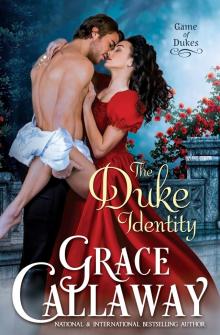 The Duke Identity: Game of Dukes, Book 1
The Duke Identity: Game of Dukes, Book 1 The Return of the Duke
The Return of the Duke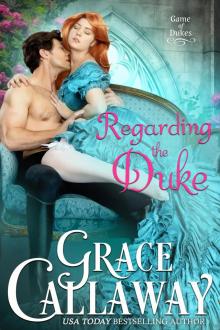 Regarding the Duke
Regarding the Duke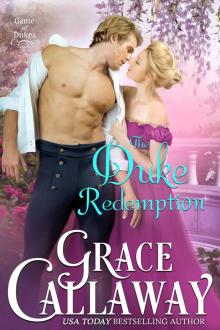 The Duke Redemption
The Duke Redemption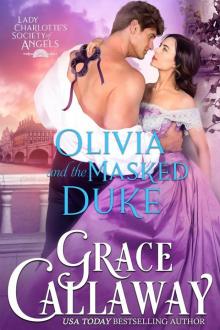 Olivia and the Masked Duke
Olivia and the Masked Duke Abigail Jones (Chronicles of Abigail Jones #1)
Abigail Jones (Chronicles of Abigail Jones #1)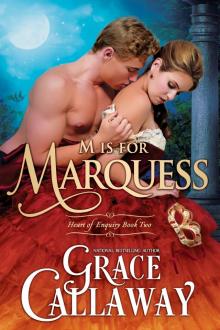 M Is for Marquess
M Is for Marquess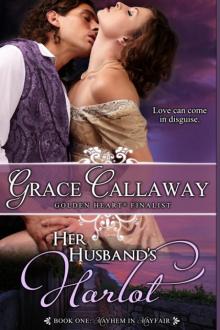 Her Husband's Harlot
Her Husband's Harlot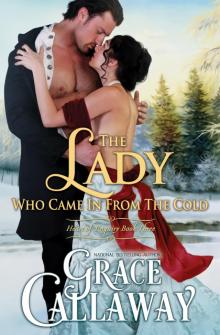 The Lady Who Came in from the Cold
The Lady Who Came in from the Cold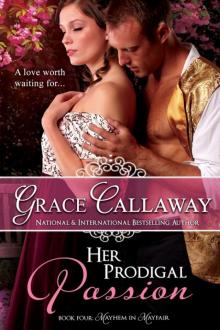 Her Prodigal Passion
Her Prodigal Passion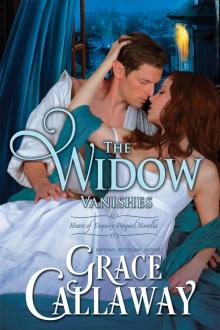 The Widow Vanishes
The Widow Vanishes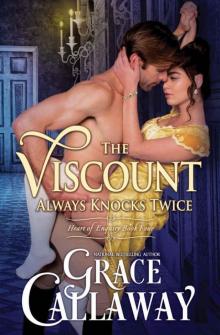 The Viscount Always Knocks Twice (Heart of Enquiry Book 4)
The Viscount Always Knocks Twice (Heart of Enquiry Book 4)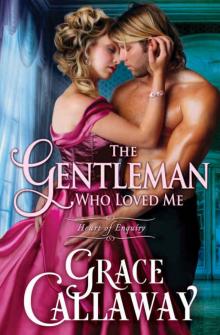 The Gentleman Who Loved Me (Heart of Enquiry Book 6)
The Gentleman Who Loved Me (Heart of Enquiry Book 6)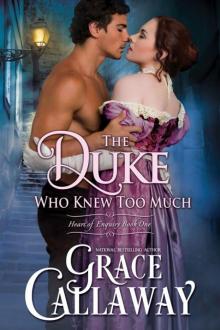 The Duke Who Knew Too Much
The Duke Who Knew Too Much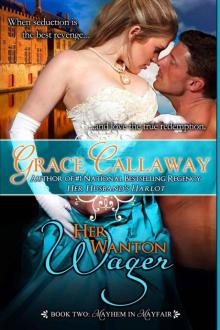 Her Wanton Wager
Her Wanton Wager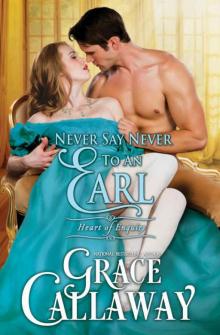 Never Say Never to an Earl (Heart of Enquiry Book 5)
Never Say Never to an Earl (Heart of Enquiry Book 5)